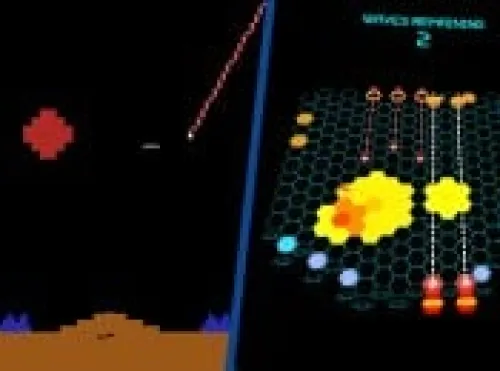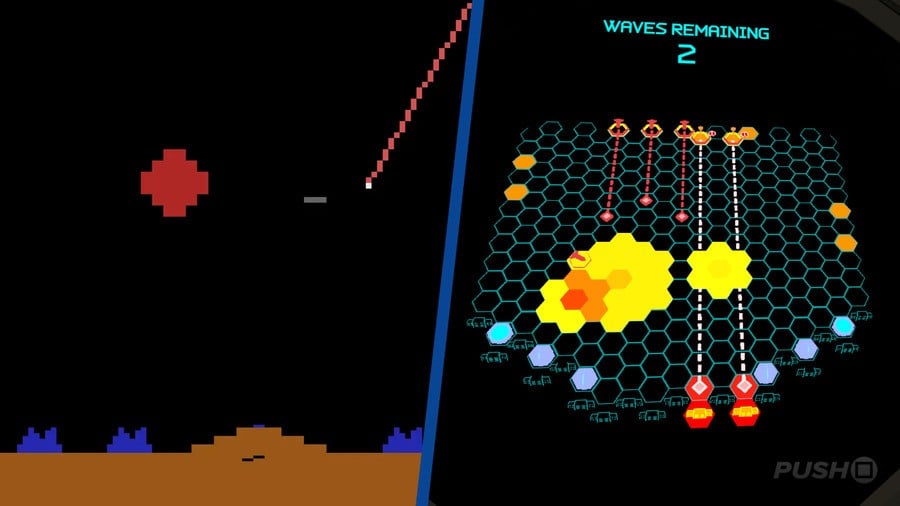- Home
- Playstation
- Interview: ‘It Almost Started as a Dare’: Missile Command Delta Devs on Modernising a 45-Year-Old Classic

Interview: ‘It Almost Started as a Dare’: Missile Command Delta Devs on Modernising a 45-Year-Old Classic

Atari has made a fascinating resurgence in recent years, one that’s seen the revival of many old school classics with fresh twists. Of these, perhaps the biggest leap so far is Missile Command Delta, bringing back the 1980 original in an almost unrecognisable form.
To learn more about this game and the thought process behind its design, we spoke to Dave Proctor, director and designer at Mighty Yell studios.
The below answers have been lightly edited for clarity.
Push Square: Of all Atari’s celebrated IPs, why return to Missile Command? What was the attraction?
Dave Proctor: Missile Command was always a game that fascinated me, before I got into games but also when I started studying them. It’s a game that tells its story entirely through its mechanics (a concept I have definitely lifted from an old Extra Credits video), and it’s so thematically strong in what it’s trying to say: you are never the attacker, you are always defensive, you are playing until you run out of options. What a weird and wonderful thing to express through play!
I also was fascinated by the what’s-happening of it all. You’re dropped into this world and you have to defend, and you can’t really ask questions… so we thought, what if you could? What if we built a mystery around that?
Your studio, Mighty Yell, and 13AM Games co-developed the project. How did that partnership come about, and what does each team bring to the game?
We go way back. I was a co-founder of 13AM back in 2013/2014, and they’re some of my best friends in the industry. We hit a point where we had this opportunity on our desks, and I wanted to work with Tom [McCall, Creative Director on Missile Command Delta] and Unai [Cabezón Lumbreras, Narrative Director] on this project anyways, and I thought, why not bring this whole project to them and see if they want to collaborate?
It timed out really well with how much capacity we both had and I knew they were the best ones to do it. From the art direction to the core game and story design, 13AM crushed this.
Missile Command Delta is very different from the original’s arcadey, real-time defence. How did you approach designing a fresh take on Missile Command?
It almost started out as a dare from Atari to do something really different with some of their classic IPs, and we started talking about what a Missile Command card game would look like. I could see it so clearly in my head and I bashed together a prototype to convince them that you could absolutely have this same kind of defensive, panicky thought process in a turn-based setup. Bringing on 13AM, they really pushed the idea to its extents, moved it to a hex-grid, really thought through the balance and design of the game.
Speaking of which, could you go over the design decisions around the missile defence side of the game?
Yes! It started with the hex grid — we needed missiles to work on diagonals as cleanly as verticals, and it makes your options (three possible directions) very clean and easy to understand.
We wanted cards because of the design affordance of card games so that players would get how they’re “playing” missiles against their opponents, and so that players would know when they found new missiles lying around that they were becoming stronger.
The biggest departure is that the game really challenges you with a one-hit-kill; if a missile touches the ground, you gotta try again. We did that because, as Tom discovered, you could get yourself in impossible situations if you didn’t encourage players to defeat every missile as it came in, and we really wanted it to have this sort of puzzle approach where what we’ve given you is the challenge to solve.
There are several layers to Delta; there’s the turn-based missile defence, but you also have first-person puzzle solving and exploration, and a front-facing narrative about a group of teenagers. What do you think these elements individually bring to the series?
I think each of these things is here to build a unique experience, it’s something that you can’t find anywhere else. There’s this intense tactical game, and this mysterious world, and these characters that really grow on you and shape how you experience the story.
I love that they all feed into each other in this synergistic way and they all build on this sense of mystery — that you are the one in the bunker discovering this stuff, that you are solving these puzzles, that you are the one who is saving the day (maybe). The more we layered ways for the player to get invested, the more engrossing the game is.
The game follows a group of teenage friends who enter a mysterious bunker that’s full of secrets. From where did you draw inspiration for the story and characters?
I love 80s movies with kids up against impossible odds. Big inspirations for the initial pitch here were things like Wargames and Red Dawn, definitely both products of the Cold War time.
For the story we wanted you to ask questions about what’s going on in the world outside, and feel distrust in reality; movies like 10 Cloverfield Lane really hit that home. Unai’s inspiration for the characters were definitely more from his own lived experience. Not about being trapped in a bunker, I don’t think.
With this game being such a departure from the original, what do you hope it captures from the 1980 hit?
I think the game’s sense of fear and reactivity are crucial to the design of this game. We want players to bring all that thought process of how to react to a given situation, and apply it turn-by-turn to a given missile challenge… but also to the rest of the game.
We want players reacting to twists and turns, and to their friends’ reactions in the bunker. We want them to feel like their choices matter and could save (or devastate) a small city. We want them asking questions about who is attacking. We want them sweating, but you know, in that fun way.
It’s a fascinating blend of old meets new; how did you approach finding a balance between nods to the past and catering to modern gaming tastes?
We definitely didn’t want the game to be too full of winks to the audience. The missile command jumpsuits and the terminals are the most direct reference to original art for the game (and the name of one of the characters, but it’s a bit more of a deep cut).
That includes mechanically. We didn’t want it to be too brutal that you feel that you’re at the old arcades, we wanted it to be forgiving enough that players could feel they could re-approach a terminal and try it again. But also we don’t cushion you with autosave, which is a nice way to rebuff players’ expectations and make sure that they’re playing carefully along the way.
Are there any closing thoughts you’d like to share about Missile Command Delta?
If I can recommend anything for anyone playing this game — try to find the secrets. There’s a lot of love in this game and just know that every one of those missile terminals is beatable. Once you start beating them, and acing them, there’s a whole other side of the story that you can uncover. The teams and I hope you love what you find.
A big thank you to Dave Proctor for taking the time to answer our questions, as well as Barzeli Schneider and Rabeeah Patail for making the interview possible.
Missile Command Delta is out now on PS5 for $19.99/£15.99, and certainly worth a look for fans of puzzles, strategy, and mystery. Have you played the game yet? Head down to the comments bunker section below.
